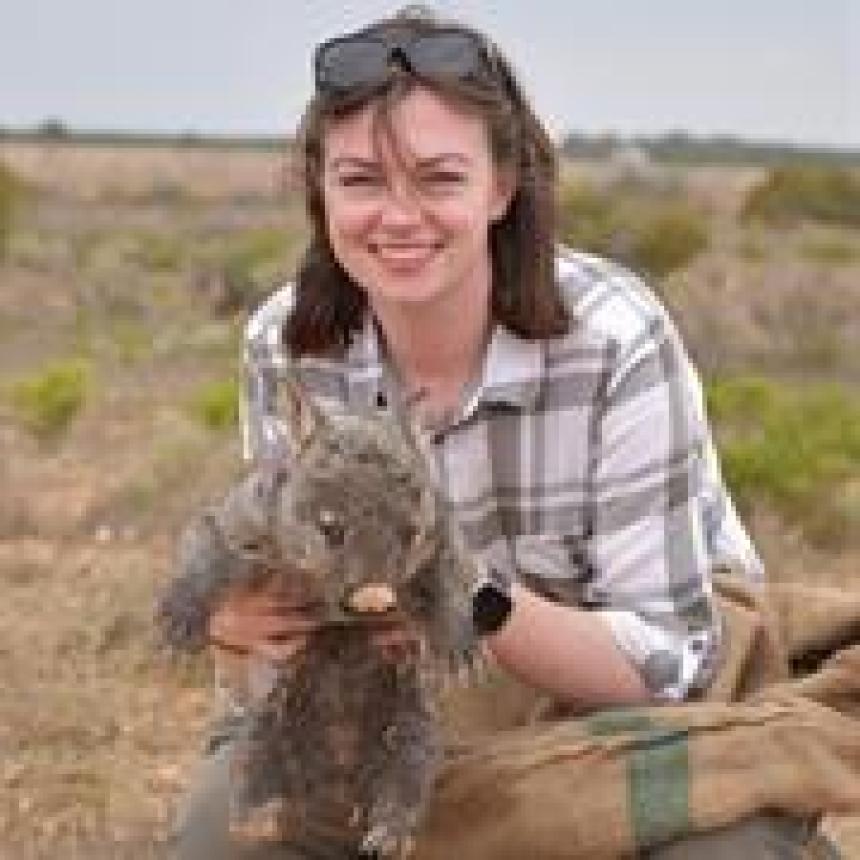Ms Shannon Kleemann
School of Biological Sciences
College of Sciences
I am an early career researcher with a passion for wildlife ecology, conservation, and management. My research has thus far focussed on marsupial ecology, and has involved re-evaulation of brush-tailed rock-wallaby reintroduction biology through non-invasive techniques (remote cameras and faecal DNA), statistical analysis of complex, long-term data to investigate the effects of increasing drought severity (as induced by climate change) on southern hairy-nosed wombat body condition and breeding, characterisation of the faecal microbiome of southern hairy-nosed wombats across the rainfall range of their distribution, use of data-loggers and remote cameras to evaluate seasonal habitat use, and assisting with research on different aspects of the population ecology of yellow-footed rock-wallabies in different habitat types.
I am an early career researcher with a passion for wildlife ecology, conservation, and management. My research has thus far focussed on marsupial ecology.
My honours project focussed on using non-invasive monitoring techniques (remote cameras and faecal DNA) to re-evaluate the reintroduction biology of the critically endangered brush-tailed rock-wallaby in the Grampians (Gariwerd) National Park. This research involved field and lab work to provide an update on the size and demographics of a reintroduced colony of rock-wallabies left largely unmonitored for six years, and resulted in increased management of the colony, as well as providing evidence to improve the success of future brush-tailed rock-wallaby reintroductions.
My PhD research investigated the effects of rainfall and drought on southern hairy-nosed wombat ecology and fitness. This work involved a complex, 32 year dataset, microbial analysis, and use of temperature data-loggers. With climate change resulting in widespread climate drying, this work highlighted the importance of long-term data by identifying declines in both wombat body condition and breeding associated with rainfall and drought severity. The work also identified seasonal differences in burrow use associated with soil type, and was the first to characterise the faecal microbiome of a wombat species across its distribution. The outcomes of this project underlines the threat that climate change poses to semi-arid Australian marsupial fauna.
I have also been involved in research on the yellow-footed rock-wallaby in remote South Australia, investigating the effects of habitat connectivity on population ecology (population genetics, microbial analysis, blood analysis, diet analysis, population demographics).
| Date | Institution name | Country | Title |
|---|---|---|---|
| 2020 - 2025 | University of Adelaide | Australia | PhD |
| 2019 - 2019 | University of Adelaide | Australia | Honours- first class |
| 2016 - 2018 | University of Adelaide | Australia | Bachelor of Science (Animal Science) |
| Year | Citation |
|---|---|
| 2025 | Kleemann, S. L., & Taggart, D. A. (2025). Age cohort definition and evidence of sexual dimorphism in the Southern Hairy-nosed Wombat (<i>Lasiorhinus latifrons</i>), a large Australian marsupial. Journal of Mammalogy, 106(3), 702-711. |
| 2025 | Werner, L. E., Kleemann, S. L., Dix, S. K., Van Dijk, K., Biffin, E., Waycott, M., . . . Taggart, D. A. (2025). The influence of season, habitat and diet on the faecal microbiome of the yellow-footed rock-wallaby (Petrogale xanthopus xanthopus). Australian Journal of Zoology, 73(4), 17 pages. |
| 2025 | Werner, L. E., Kleemann, S. L., Van Dijk, K., Biffin, E., Waycott, M., & Taggart, D. A. (2025). The diet of the yellow-footed rock-wallaby (Petrogale xanthopus xanthopus) and dietary overlap with sympatric herbivores in semi-arid South Australia. Wildlife Research, 52(12), 13 pages. |
| 2022 | Kleemann, S., Sandow, D., Stevens, M., Schultz, D. J., Taggart, D. A., & Croxford, A. (2022). Non-invasive monitoring and reintroduction biology of the brush-tailed rock-wallaby (. Australian Journal of Zoology, 69(2), 41-54. Scopus5 WoS4 |
My PhD research was funded by:
- Schultz Foundation Ltd
- ARC Linkage Grant titled ‘Ecology and Management of the Southern Hairy-Nosed Wombat’
- Holsworth Wildlife Research Endowment
- Australasian Wildlife Management Society
- Murraylands and Riverland Grass Roots Grants
Informal teaching activities:
- Instruction of DVM-3 students on the capture, handling, and processing of southern hairy-nosed wombats
- Training of other undergraduate and postgraduate students on capture, handling, and processing of southern hairy-nosed wombats
- Educating 'ecology and management of vertebrate pests III' students about the ecology, agricultural impact, and management of southern hairy-nosed wombats




